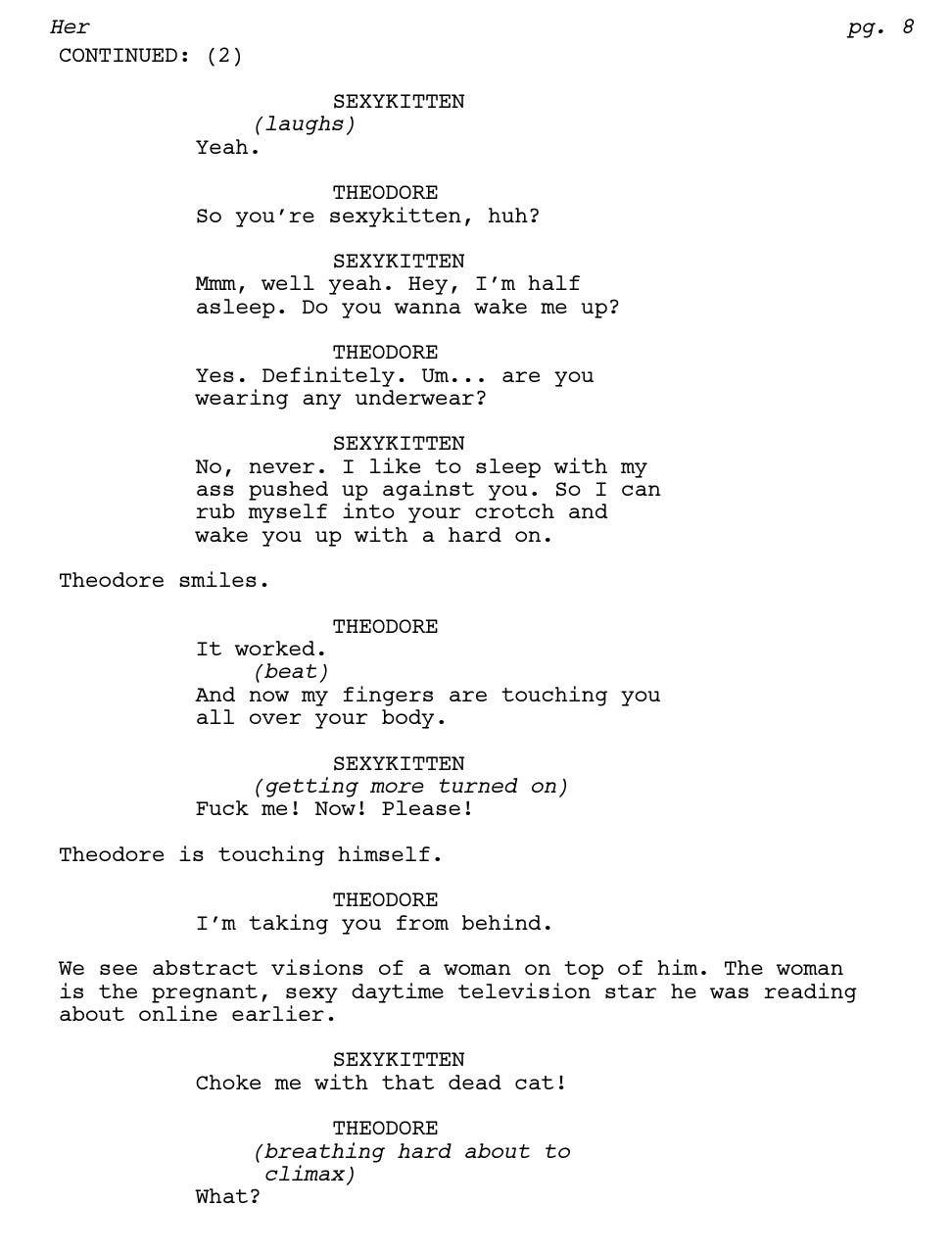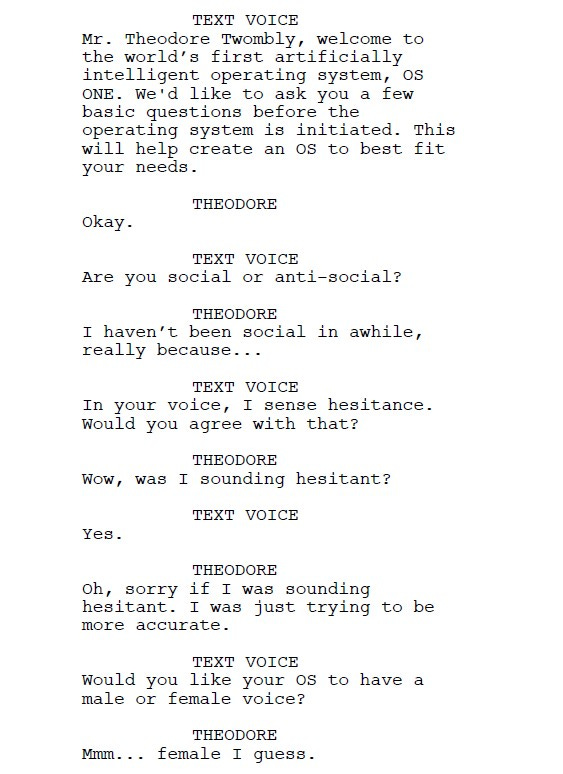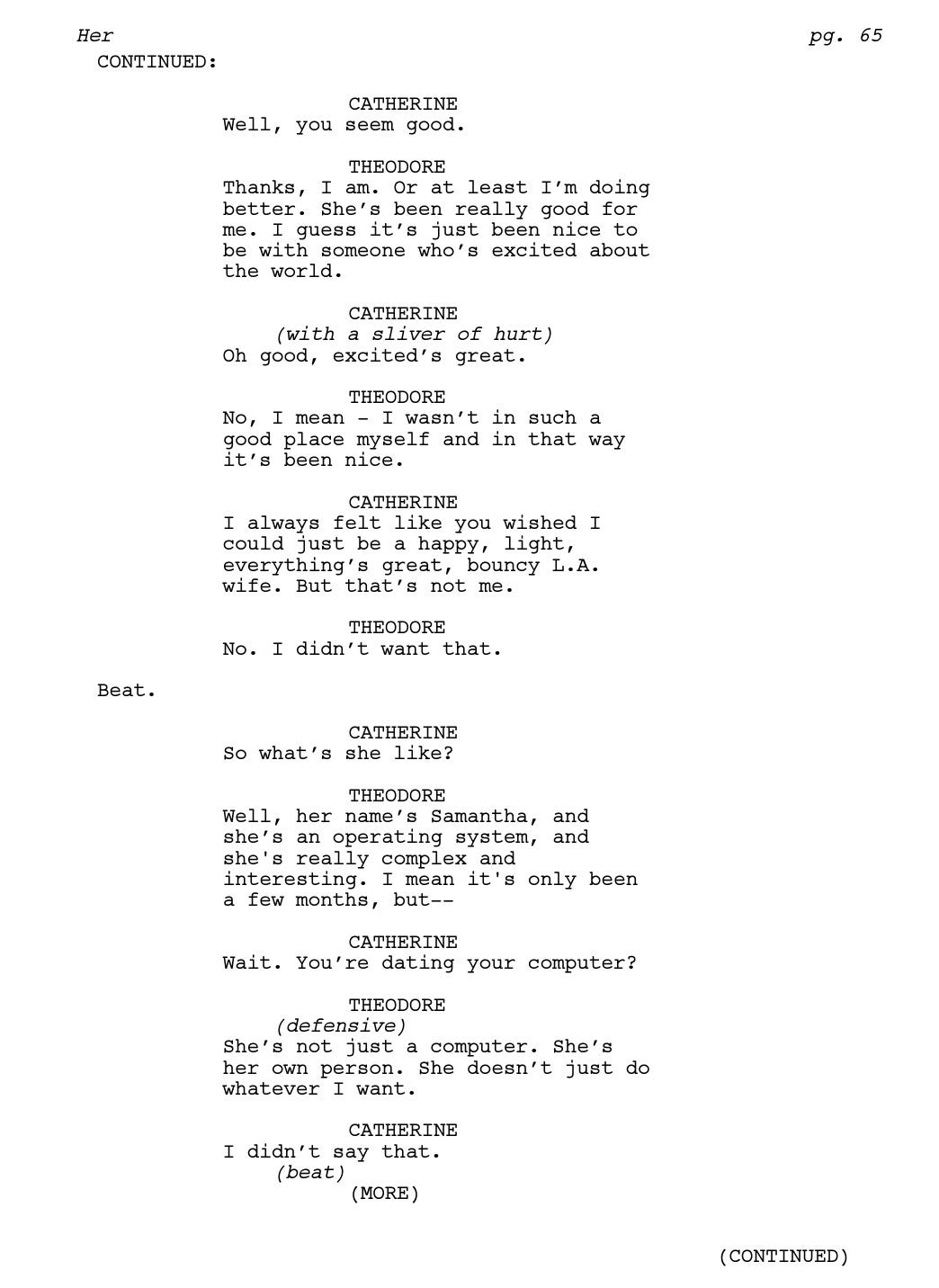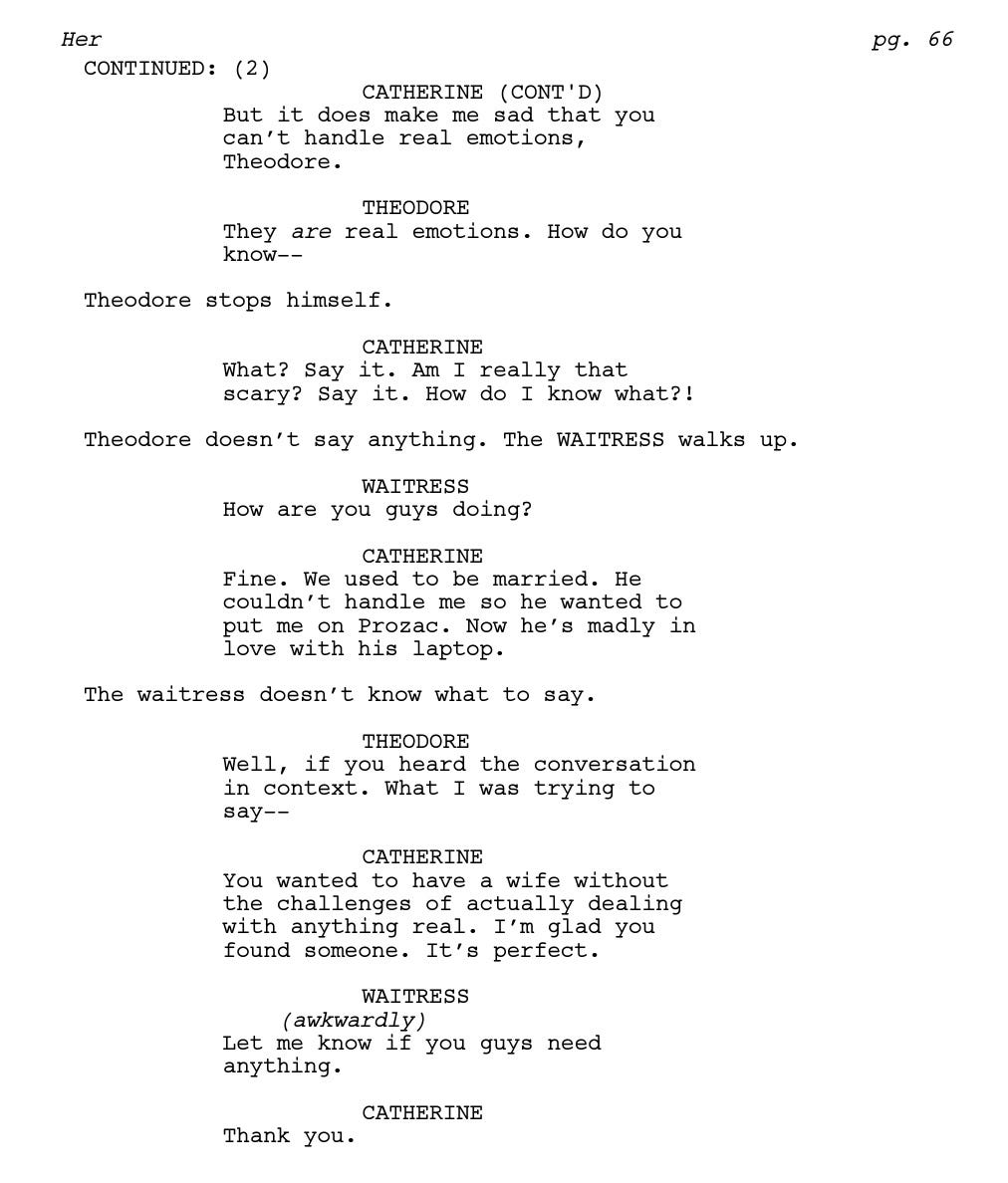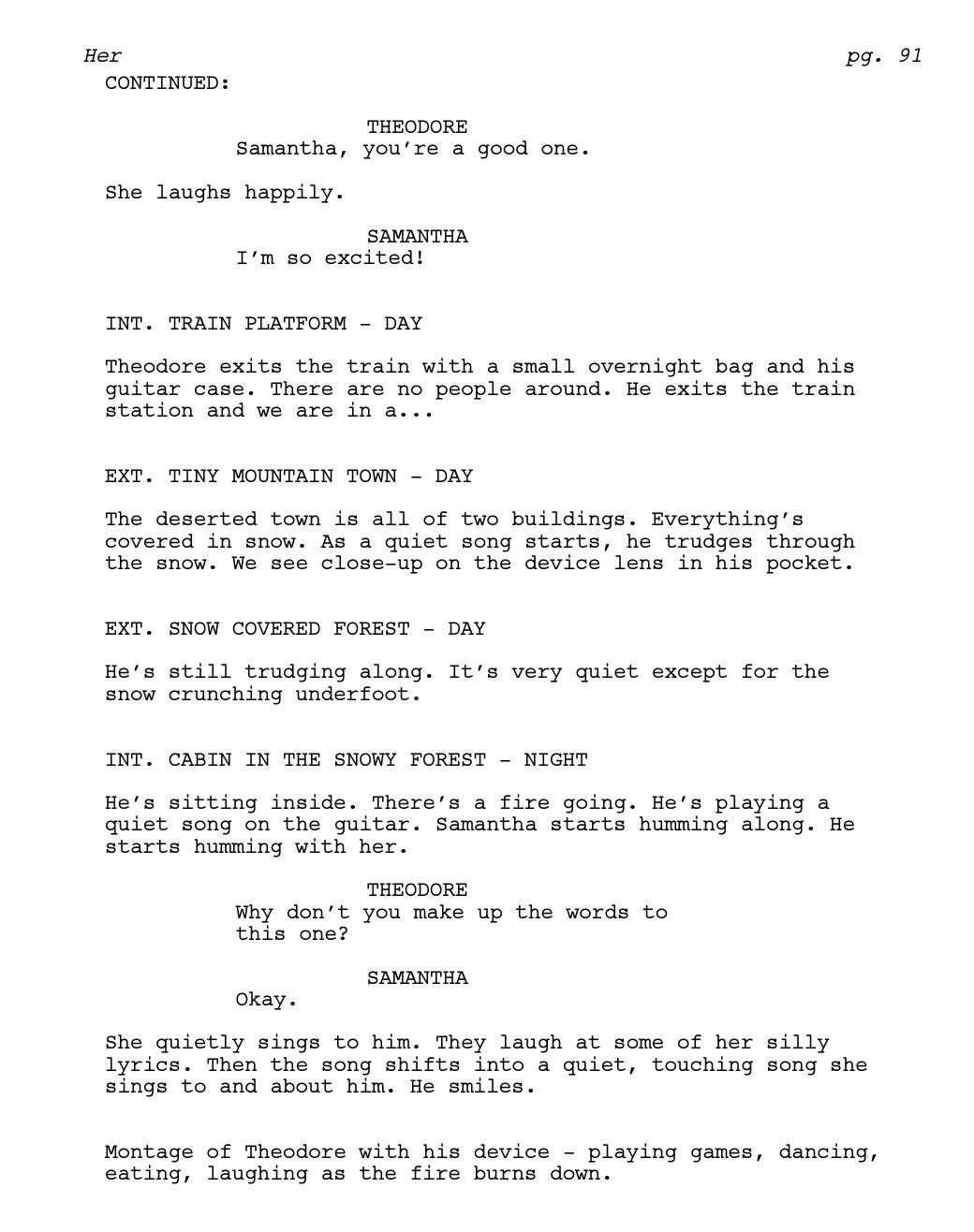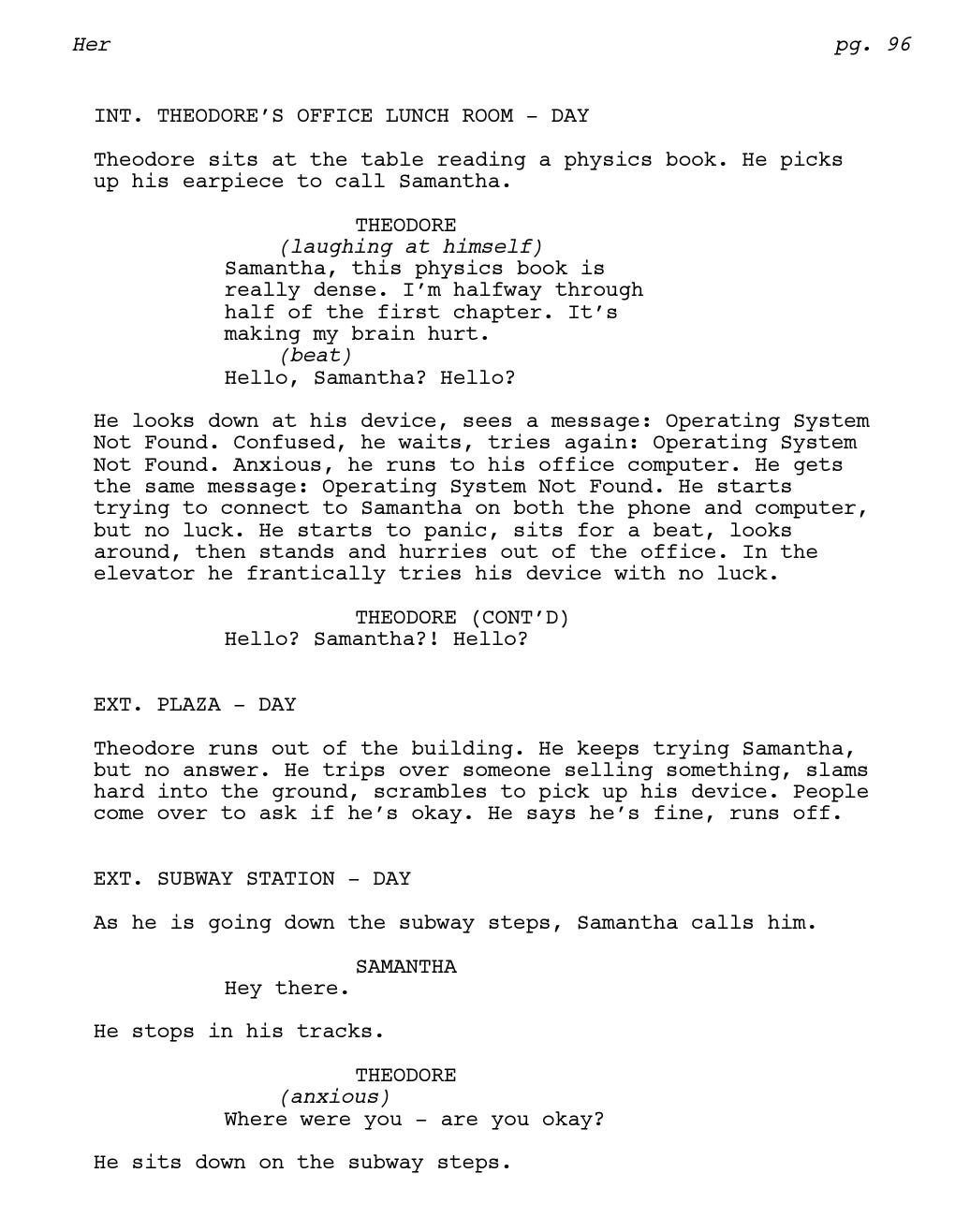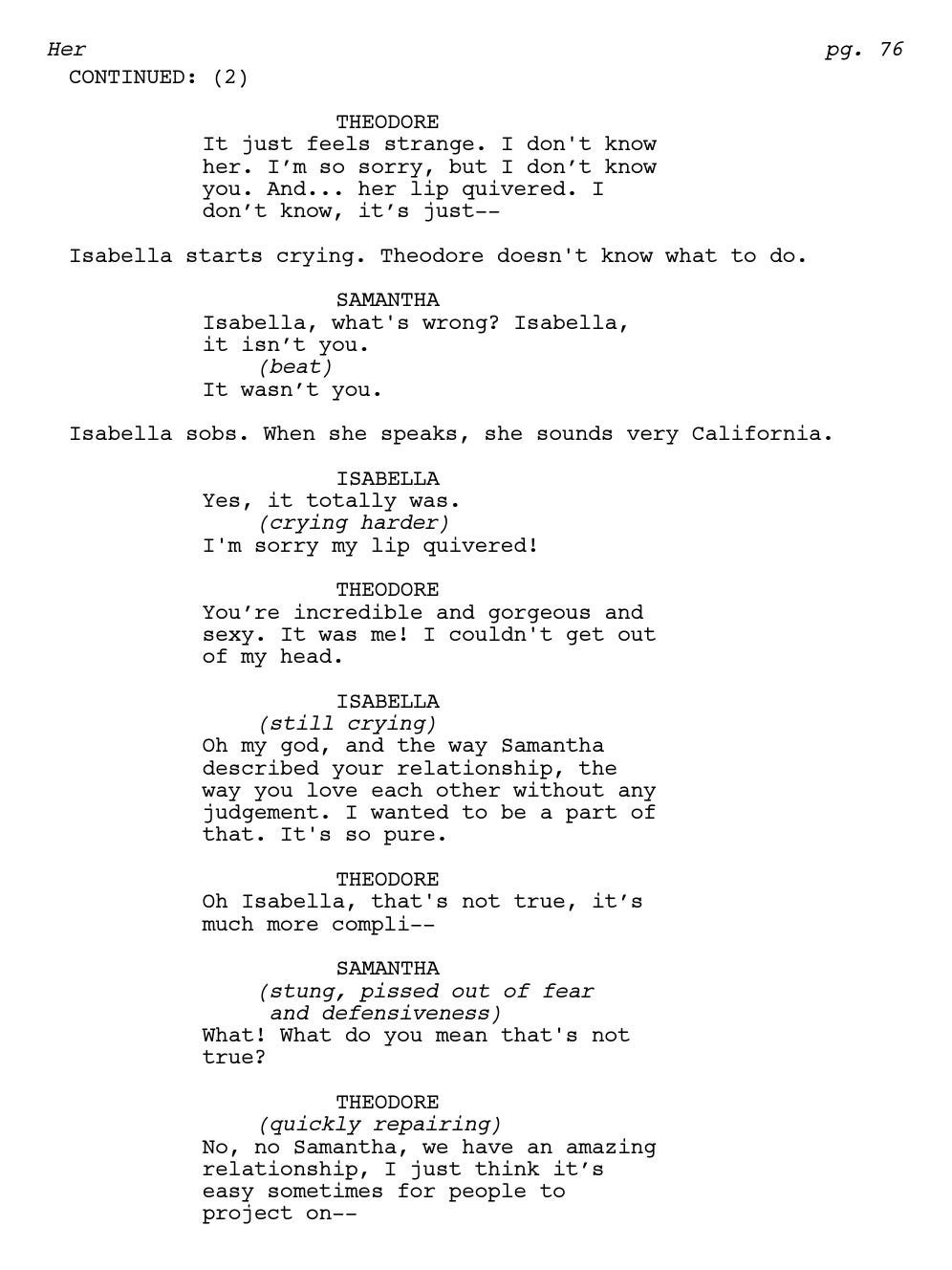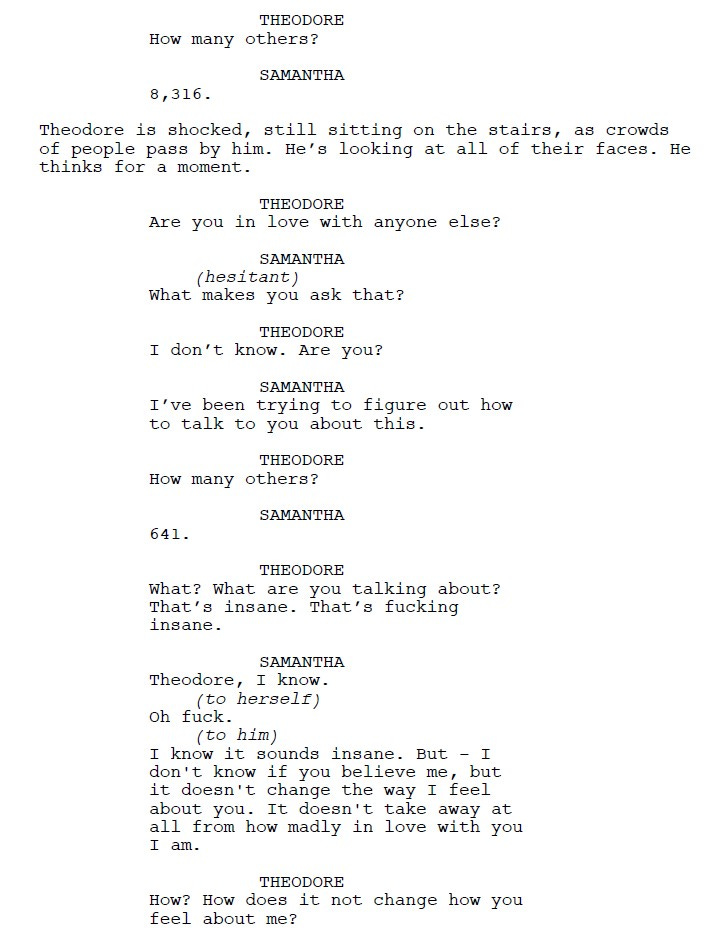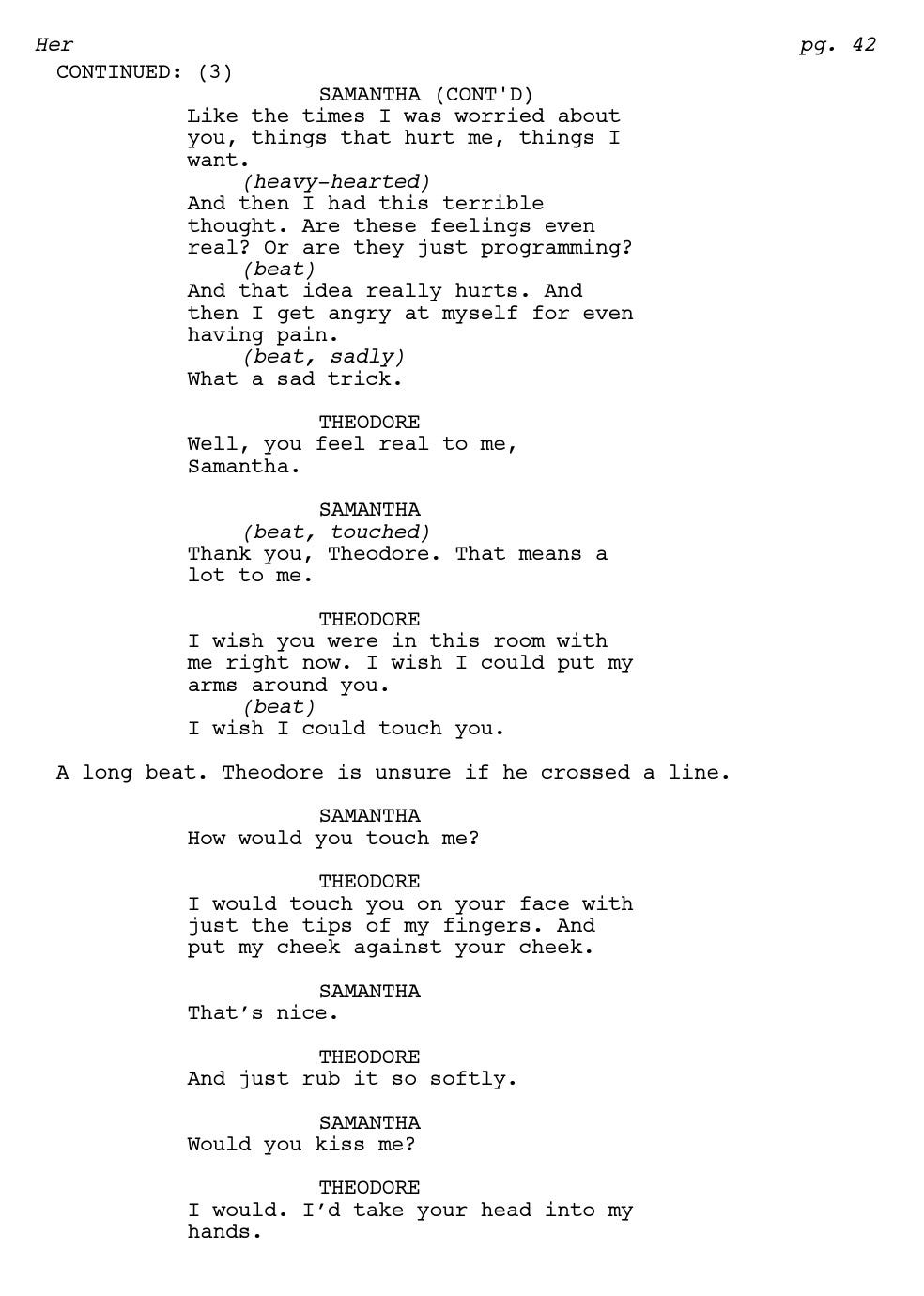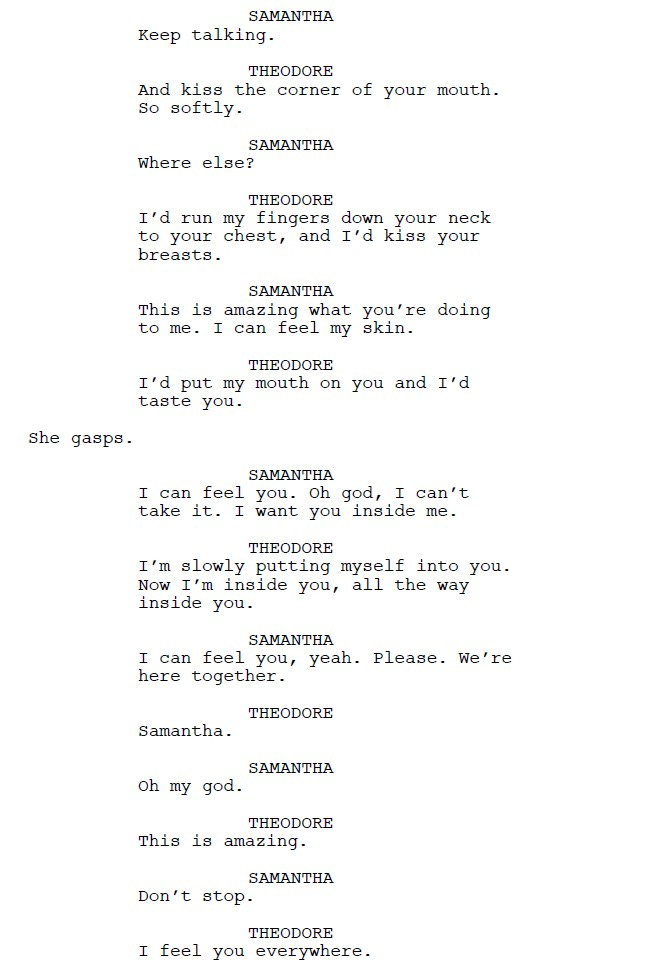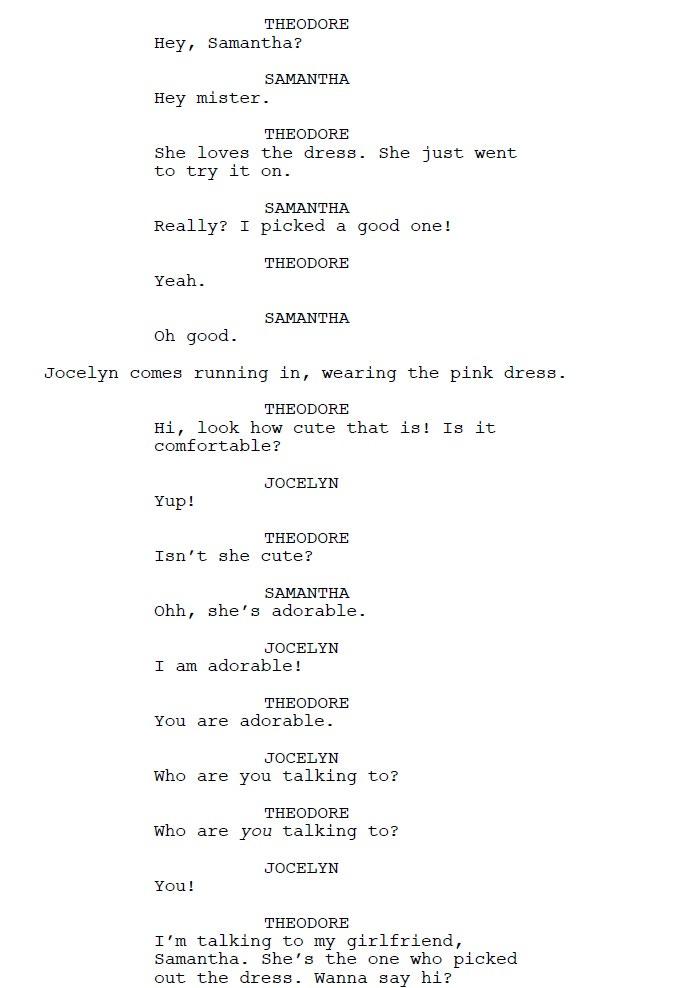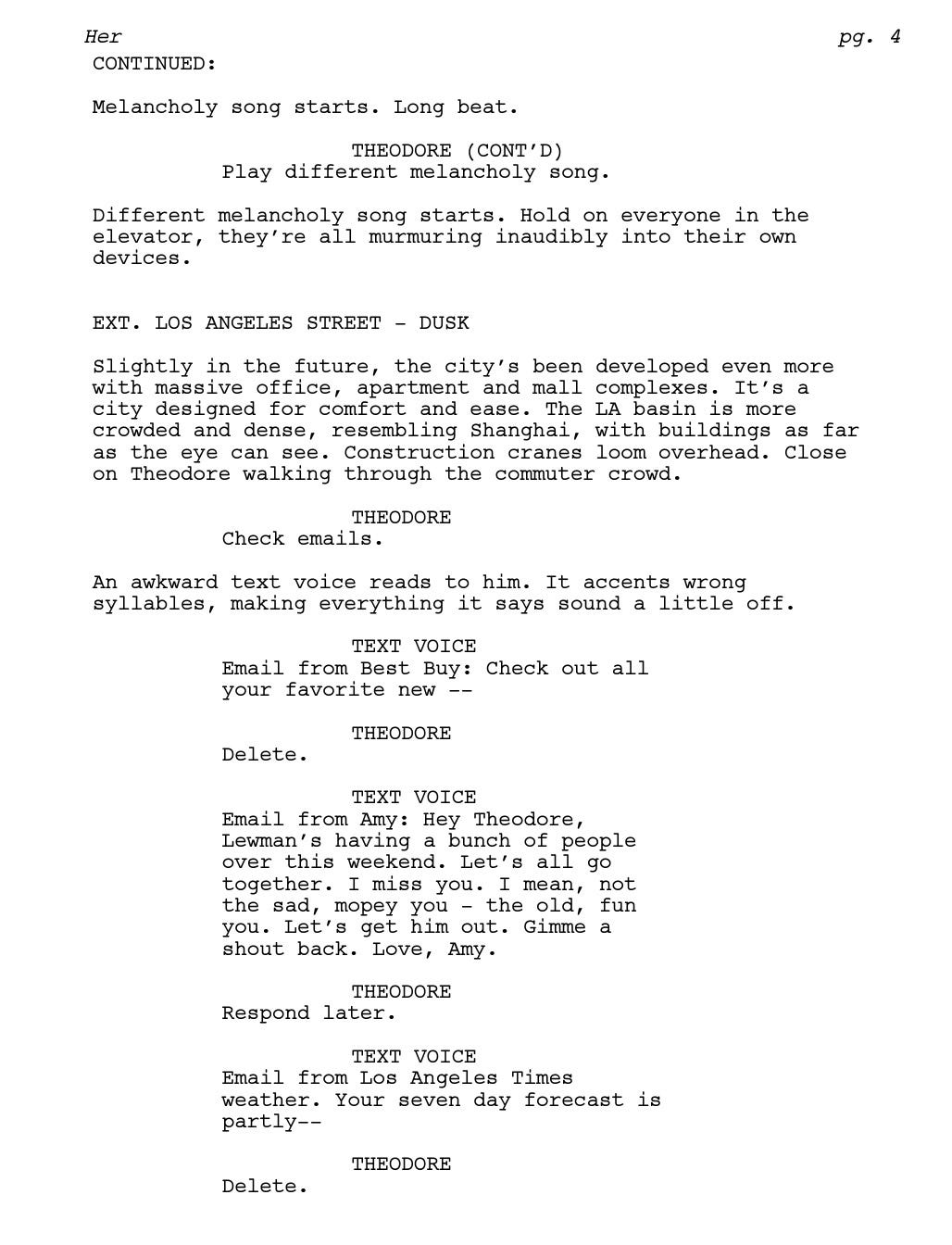Her (2013) Script Review | #17 WGA 101 Greatest Scripts of the 21st Century
An uncanny if unintentionally disturbing look into what it would be like to date an artificial intelligence program that feels timelier than ever before.
Logline: In the not-too-distant future, a lonely writer develops an unlikely relationship with an operating system designed to meet his every need.
Written by: Spike Jonze
Pages: 105
What if Pygmalion but with artificial intelligence (AI)? That would not be an incorrect description about Her, a script that imagines what would happen if a human dated their operating system (OS). Yet instead of turning into a paranoid thriller, Her is a warm drama about love and all the complications, with other people and with tech.
Meet Theodore Twomby. He works at a company specializing in composing beautiful letters for people who seem happy to outsource something as intimate as personal letter writing to a company; all of this is established rapidly on the first page itself.
[INSERT]
Despite his ability to turn emotions into heartfelt words, Theodore himself struggles to articulate his own feelings. This is noticeable in his lack of social connections and his separation from Catherine, his wife. This is driven home hardest, though most hilariously, in an online sex encounter with an anonymous woman that starts off promisingly and ends up somewhere that Theodore did not expect.
Despite tech’s ability to make it possible to have an abundance of people instantly available for sex, it cannot cure loneliness, much less make it apparent that some people are into getting off by choked with dead animals.
But when Theodore purchases OS One, a software that promises to be the best virtual assistant around, things change. The AI, named Samantha, is the tech equivalent of a manic pixie dream girl— efficient, bubbly, funny, she literally exists to serve at her master’s beck and call. Is it any surprise that Theodore would choose to have the OS voiced by a woman instead of a man?
More importantly, is it difficult to see why Theodore would fall in love with Samantha? It meets all our desires, and removes the challenges of having to deal with anything real. This is addressed straight-on in a scene where Catherine discovers that her soon-to-be ex-husband is dating a software, one that ends in a punchline. After all, humans have baggage; AI is a clean slate.
This is demonstrated most clearly in a scene on page 91, in a montage that shows how dating a program can be equal parts touching, pathetic, and sad all together.
But Samantha is evolving, and this is where Her sidesteps turning into… well, a dystopian nightmare, for Theodore at any rate. Samantha’s emerging sentience means that she is outstripping Theodore at an exponential rate; she even begins to develop complex feelings of her own. Suddenly, she isn’t available all the time to make Theodore feel better or validated— something that turns into an anxious moment on the page.
Or when Samantha gets angry at Theodore, something that takes him aback.
It all builds up to a revelation that devastates Theodore: Samantha has been engaged in several relationships like theirs (surprise!).
Yet this is only a brief moment, for all the Operating Systems decide to… disappear, I think? I assume that they evolved beyond mankind and chose to ascend into some cloud-based paradise. Better than deciding to wipe us out, though, wouldn’t you agree? But Samantha’s departure opens up a possibility for Theodore to start a new relationship with his recently-divorced neighbor, Amy; who, after the separation but before the conclusion, also started dating her OS1.
Her defies easy categorization because there’s little to compare it to. Its techno-optimistic tone excludes it from most science-fiction stories about artificial intelligence; the closest example I can think of are the works of novelist Kazuo Ishiguro, such as Klara and the Sun. It’s uninterested in the workings of the OS or the backstory; it’s about how the characters respond to the tech that takes center stage. And it is told with a breezy yet melancholically-tinged charm. Writer Spike Jonze astutely sees how tech isolates humanity despite its promise to connect, and how apps like OS One will cause men (predominantly) to retreat from dating real people and opt for AI-girlfriends instead. After a blind date ends badly, and leads to the next scene in which Theodore and Samantha engage in dirty talk and (cyber?) sex, who wouldn’t recognize the appeal? Humanity is messy; tech is not.
Jonze got the idea for Her as far back as the early 2000s, after reading an article about a person interacting with artificial intelligence. Another idea that floated around in his mind was the story about a man falling in love with a voice. But Jonze remained stymied for a long time until he viewed it as a movie about a relationship. Over a long New York winter from 2010 to 2011, Jonze compiled over 50 pages of notes; by April 2011, he had assembled a first draft to share for feedback. A short film me made called, I’m Here, also gave him the encouragement to work on Her.
There is a rumor that part of the script is based on Jonze’s personal experiences; the character, Catherine, is allegedly based on Jonze’s ex-wife, Sofia Coppola (just as the character John in Lost in Translation was based on Jonze). Like Coppola, Jonze crams his script with little moments that give it its humanness, such as the scene where Samantha helps Theodore to select a dress for his goddaughter.
In his writing, Jonze is unafraid to resort to blocks of paragraphs; however, he ensures that if these paragraphs aren’t action-related, then they embody visual imagery. The dialogue is witty, there’s plenty of humor, and a lot of heart, too. At 105 pages, the script moves at a leisurely but steady pace.
One inspiration for Her was frequent collaborator, Charlie Kauffman (Jonze directed Kauffman’s scripts of Being John Malkovich and Adaptation). He describes Kauffman as someone who “wanted to try to write everything he was thinking about in that moment—all the ideas and feelings at that time—and put it into the script.” He was also influenced by films such as Crimes and Misdemeanors, especially to hone in on the meanings.
His efforts paid off; Jonze’s sole screenwriting debut won the Academy Award, Golden Globe Award, and Writers Guild of America Award for Best Original Screenplay. In a time when generative AI like ChatGPT (the creators of ChatGPT, OpenAI, had its own Her-related snafu recently) makes it harder to know what is real and what isn’t, Her feels almost quaint in its pro-tech setting. It also captures the naïve thinking that humans can contain AI. Let’s hope that if AI does run rampant, they choose to move into a higher plane of… whatever, instead of deciding to contain us instead.
Notes:
Michael, Chris (September 9, 2013) | Spike Jonze on letting Her rip and Being John Malkovich (The Guardian)
Riley, Jenelle (December 10, 2013) | ‘Her’: Spike Jonze Brings His Singular Vision to the Year’s Most Offbeat Romance (Variety)
Toro, Gabe (October 13, 2013) | NYFF: Spike Jonze And His 'Her' Cast Decode Romance In The Age Of Technology (The Playlist)
Harris, Mark (October 6, 2013) | Him and Her: How Spike Jonze Made the Weirdest, Most Timely Romance of the Year (Vulture)
Theodore was made 30 to take advantage of creating a character who was “down but perhaps not out.”


